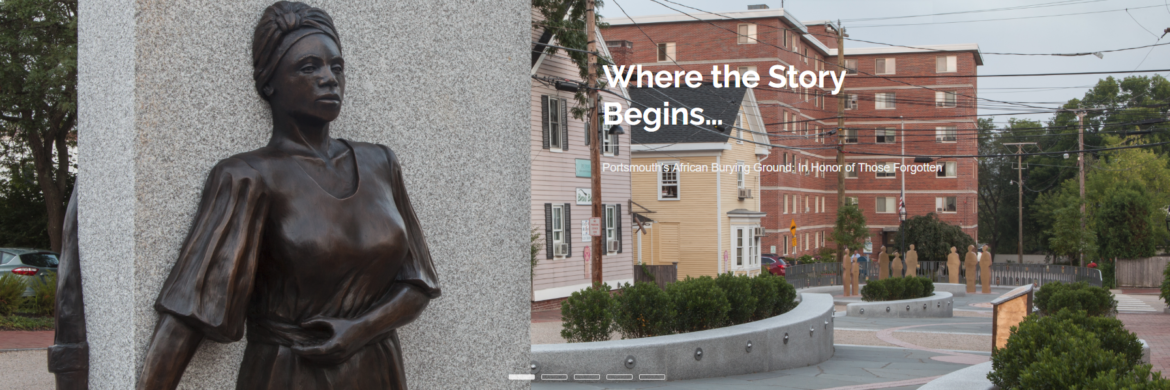By Mark Okrant, NH Travel Guru
There were literally hundreds of roadside attractions located along the nation’s blue highways years ago. These promised everything from the world’s largest ball of string to a Redstone rocket. Most travelers were unaware that a treasure-trove of significant cultural artifacts was a day’s drive from where they were passing.
One organization that has worked tirelessly to share an authentic part of the state’s legacy is the Black Heritage Trail of New Hampshire (BHTNH). Founded as a Portsmouth entity in 1996, under the leadership of Valerie Cunningham, the organization exists to raise public awareness and appreciation of the vital role African-American culture has played in shaping New Hampshire.

Mark Okrant
As JerriAnne Boggis, present executive director of BHTNH tells us, “The organization’s goal is to use increased dialogue to open the hearts and minds of the public, thereby creating a deeper understanding of who Blacks are collectively, and how they occupy a place in America’s heritage.”
Despite the fact that black and white Americans have intermixed to create American society in a multitude of ways, this narrative has not fit comfortably into the prevalent story being told by authors of history textbooks and others. While Boggis and her BHTNH colleagues are very effective in researching the past and present accomplishments of New Hampshire’s black community, a contradiction remains between the black and predominantly white histories of the state and nation.
BHTNH hopes to counter misperceptions about disparate black and white societies by sharing the personal histories of countless black residents of the state—in their roles as free laborers, as runaway slaves, and as people who contribute significantly as educators, entertainers, and civic leaders. The heritage of these early Americans is fascinating, and should be of utmost interest to everyone who values the state’s history.
Given the significant presence of black people in New Hampshire during the last three hundred years, it is truly disappointing that today’s public school children (and their parents and grandparents) are unaware that black children and young adults were once sold on the wharf in Portsmouth, that Governor Langdon supported the efforts of George Washington to recover his “runaway property,” that Richard Potter was one of the most popular entertainers in America two hundred years ago, or that Harriet Wilson was the first African-American woman in North America to publish a book.
Now, the question is, what are the best methods for BHTNH to make their “corrective narrative” known to the general public. Despite the number of scholarly efforts, the knowledge gap has not been bridged. Perhaps the answer lies in travel and tourism.
Audiences, and travelers in general, crave experiences. They want to be immersed in their learning processes. Education is the key, but it must be accurate and compelling at the same time . . . a dash of drama/adventure makes learning more palatable and meaningful.
To date, the organization has created a series of bronze plaques that highlight black community activities dating from the colonial era to the Civil Rights movement. Their excellent website (www.blackheritagetrailnh.org) provides historical background information and identifies a wealth of events and conferences. The Portsmouth component of the Black Heritage Trail contains twenty-seven sites which can be visited as a whole, or by following a number of themes that include (but are not limited to) “Enslavement and Emancipation,” “Work,” and “Resistance and Civil Rights.” Guided walking tours and trolley tours, led by well-prepared guides, also are available by request to residents and visitors.
The recently expanded Black Heritage Trail will connect the stories of New Hampshire’s African heritage by documenting and making visible many more historic sites statewide that testify to this rich history.
Recognition and acceptance of certain cultural minorities has not had a smooth path in this country. This is an issue that should be of concern to all Americans. BHTNH has done a remarkable job of collecting and organizing materials that tell the documented history of Africans in America. Change in the perceptions of African-American culture and its future place in society, will only occur by understanding the real story.
Your Guru believes that tourism can play a vital role in ensuring that this story achieves a proper conclusion. Toward that end, I am asking our readers to contact me at my author email site (info@markokrant.com) to share new ideas about the ways tourism can facilitate dissemination of BHTNH’s message.
After forty years as an educator, researcher, and consultant, Mark Okrant joins IndepthNH.org to offer concise, informative insight into New Hampshire’s travel and tourism industry as a business, while showcasing the people and places you want to know. This guy’s really been around. And, he’s funny, too.
For more about Mark’s compelling tourism-based murder mystery series, visit www.markokrant.com.
For information on current things to do in New Hampshire, go to: http://www.visitnh.gov/what-to-do/event-calendar.aspx





